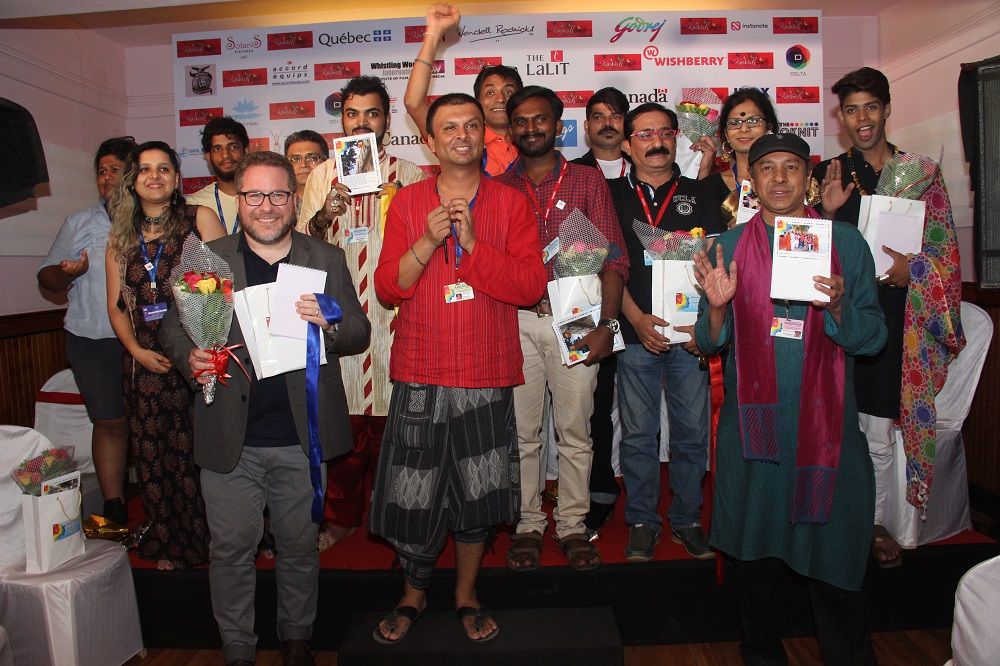TOGETHER WITH PRIDE: PANEL DISCUSSION ON PRIDE PARADES IN INDIA

On May 26, 2018, 10 activists from the LGBTQ community in India and Canada came together in a Panel discussion at the 9th edition of KASHISH Mumbai International Queer Film Festival by responding to the question “How do pride Marches empower the community in your city/town?’. The panel was facilitated by the Consulate General of Canada.
Each of the participants spoke about the pride in their city and provide insight into the context in which they operate, the challenges they faced, and the trajectory of their respectively organized Marches. We had panelists who represented or were a part of Pride Committees Canada, Bhopal in Madhya Pradesh, Karnataka, Delhi, Kolkata, Mumbai, Kerala, Dinajpur in West Bengal, Hyderabad, and Lucknow.
Most representatives of smaller cities said that in order to conduct a Pride March, they first had to mobilize the community which was a difficult job as a lot of the community members did not want to come out and felt unsafe, but the spirit of the organizers was such that even if 10 people came to the parade, they would have been ecstatic. Interestingly, we found that a lot of this mobilization was done through online dating apps as well as other forms of social media.
The town of Dimapur had its pride parade due to the efforts of Joyita Mondal, a transgender activist, who received help from government machinery, as well as Pride organizers in Kolkata and was able to get the district judge to inaugurate the Pride Parade. In their first pride they managed to mobilize the transgender community along with others, although it is acknowledged that caste did become a barrier.
In the city of Lucknow, the Awadh Pride Committee managed with a lot of difficulties to organize their first Pride March, as their representative admits that Lucknow is a very conservative city and stereotypes are very rigid when it comes to the religious and politics climate of the place. However, in spite of these odds they managed to defy all odds and acquired all necessary permissions to conduct the March.
With regard to Bangalore, what was unique about it is that it calls for inclusivity of all queer people in the state and the collective is called as the Kannada Queer Hubba (Hubba means festival in English). Moreover it has turned out to be the most disability friendly Pride March in all of India.
Delhi is a city where the Pride March has a flavour of protest rather than celebration. According to a panelist Mr. Aditya, who could not technically even represent the Queer Pride Collective of Delhi, the collective happens to be very politically correct and rigid in terms of their views.
The LGBTQ community in Bhopal was also organized through social Media and Bhopal celebrated its first-ever Pride Month between April and May. During the discussion, some light was shed upon an incident in the early 1990s where 2 female police constables got married and were promptly dismissed from service. This caused an uproar in the society back then and there were protests to protect the rights of the LGBT, which could be termed as the oldest ever Pride March in India. Hyderabad too started having pride marches recently and it has been steadily gaining traction since then, although they were not able to include more and more sections of the LGBT community like transgender and Queer Women.
The Mumbai Queer Azaadi March too has faced many hurdles since its inceptions as Vivek Patil recounted some of them. However, the Pride March in Mumbai continues to be the largest and strives to be more inclusive of various other sections of the community like non-binary genders, intersex etc.
The Kerala Queer Pride has the most unique elements as it is held in different cities and towns all over Kerala and the collective strives to educate the children about the community wherever they go and they also grant facilities and scholarships to brilliant students. The most striking point of is that the Straight Allies decided to have a march for the LGBT community so that they do not feel left out in society. The Kerala Pride Committee also seemed to have a very diverse representation, something which was reflective of the state.
In its essence, though each pride march is different and reflective of the place it is held in, it does the job of mobilizing the community, celebrating identities and bringing people together in solidarity with one another.
